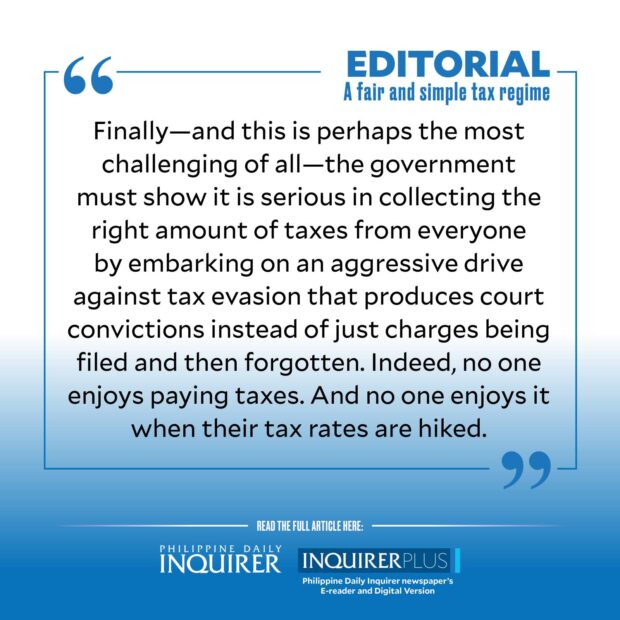A fair and simple tax regime
No one enjoys paying taxes.
And, definitely, nobody likes the idea of their tax rates being increased, especially when the government’s inability to collect the right amount of levies from the wealthy, the powerful, and the well-connected—coupled with the spendthrift ways of the previous administration that are threatening to make a comeback in the present one—are plain for everyone to see.
Article continues after this advertisementBut taxes are one of life’s two certainties, along with death, said Benjamin Franklin. So they must be paid and, ideally, paid promptly by every citizen under pain of penalties or punishment.
But paying taxes in the Philippines is its own special kind of torture with complicated laws and convoluted regulations that make it difficult for even the most diligent citizen to fulfill his or her obligations of helping fund the government faithfully.
Thankfully for individuals, small businesses, and investors who have long been at the mercy of tax authorities (for whom intricate and sometimes subjective interpretations of revenue regulations seem to hold a special delight), it seems that President Marcos is aware of the problem and has recently vowed to address these concerns.
Article continues after this advertisementTo this end, the Chief Executive should certify as urgent the proposed Ease of Paying Taxes Act sponsored by Albay 2nd District Rep. Joey Salceda which, if passed by Congress and enacted by the President in its current form, will simplify tax filings for small- and medium-sized businesses, allow most tax processes to be done online, and shift to an invoice system that accelerates tax refunds, especially those automatic value-added-tax levies on most transactions.
The bill also proposes the creation of a special division within the Bureau of Internal Revenue (BIR) to focus on attending to the needs of (and presumably collecting from) small and medium enterprises. Indeed, the BIR has a large taxpayers’ service for making revenue collections from large corporations and conglomerates more efficient, why not a separate division to ease the burdens of smaller entrepreneurs who comprise over 95 percent of registered businesses in the country? Ideally, this proposed tax legislation will also make it easier for Filipinos to update their tax records and receive basic services like obtaining tax identification numbers from wherever they are instead of lining up for hours at BIR offices. Technology has advanced by leaps and bounds in recent years, allowing people to perform identity verification online. Banks have been doing it since the advent of the COVID-19 pandemic, so there’s no reason why government can’t do the same.
But beyond this, it is obvious that the country’s fiscal system—that is, the collection side and the spending side—need to be overhauled to make government more efficient at levying what is due to it, while spending wisely these precious resources where they are absolutely needed.
Doing so means simplifying tax laws to make it more palatable for people to comply with them. One cannot change human nature of grumbling when parting with one’s hard-earned money, but a less complicated code will make compliance easier and, by extension, raise collections.
Part of this will be to make receiving refunds easier and faster like in more advanced economies where people grumble less about paying taxes because they know that excess payments will promptly be returned to them by honest auditors (unlike here when disputes can take years of legal wrangling to be resolved).
Meanwhile, larger businesses and investors from overseas must be reassured that they will be taxed fairly instead of being fleeced for money. The government must implement a fair tax regime that will encourage local and foreign corporations to put up job-creating offices and factories with incentives, while making sure that those incentives are not abused by those who don’t need them, don’t deserve them, or have been enjoying them for far too long.
Finally—and this is perhaps the most challenging of all—the government must show it is serious in collecting the right amount of taxes from everyone by embarking on an aggressive drive against tax evasion that produces court convictions instead of just charges being filed and then forgotten.
Indeed, no one enjoys paying taxes. And no one enjoys it when their tax rates are hiked.
But paying taxes is necessary, and some tax increases are inevitable since the current administration needs to pay for the excesses of the past one as well as the current economic challenges. The least that can be done by government—the executive, legislative, and judicial branches—is to help honest citizens pay their share, and penalize those who don’t.

















